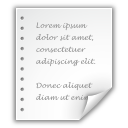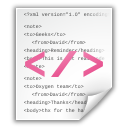Sanditon / compiled by Lou Burnard
| dc.contributor | Burnard, Lou Computing Service, University of Oxford |
| dc.contributor.author | Austen, Jane, 1775-1817 |
| dc.date.accessioned | 2018-07-27 |
| dc.date.accessioned | 2019-07-04T10:58:14Z |
| dc.date.available | 2019-07-04T10:58:14Z |
| dc.date.created | 1817 |
| dc.date.issued | 1981 |
| dc.identifier | ota:0017 |
| dc.identifier.citation | http://purl.ox.ac.uk/ota/0017 |
| dc.identifier.uri | http://hdl.handle.net/20.500.12024/0017 |
| dc.description.abstract | Resource deposited with the Oxford Text Archive. |
| dc.format.extent | Text data between 512 KB and 1 MB |
| dc.format.medium | Digital bitstream |
| dc.language | English |
| dc.language.iso | eng |
| dc.publisher | University of Oxford |
| dc.relation.ispartof | Legacy Collection Digital Museum |
| dc.rights.uri | https://ota.bodleian.ox.ac.uk/repository/xmlui/page/licence-ota |
| dc.rights.label | ACA |
| dc.subject.lcsh | Novels -- Great Britain -- 19th century |
| dc.subject.other | Novels |
| dc.title | Sanditon / compiled by Lou Burnard |
| dc.type | Text |
| has.files | yes |
| branding | Oxford Text Archive |
| files.size | 591592 |
| files.count | 2 |
| otaterms.date.range | 1800-1899 |
Files for this item
Download all local files for this item (577.73 KB)

- Name
- sanditon-0017.txt
- Size
- 573.04 KB
- Format
- Text file
- Description
- Version of the work in plain text format
SANDITON
CHAPTERl
A GENTLEMAN AND A LADY travelling from Tunbridge towards
that part of the Sussex coast which lies between Hastings and
Eastbourne, being induced by business to quit the high road and
attempt a very rough lane, were overturned in toiling up its long
a scent, half rock, half sand.
The accident happened just beyond the only gentleman's house
near the lane -- a house which their driver, on being first required
to take that direction, had conceived to be necessarily their object
and had with most unwilling looks been constrained to pass by.
He had grumbled and shaken his shoulders and pitied and cut his
horses so sharply that he might have been open to the suspicion
of overturning them on purpose (especially as the carriage was
not his master's own) if the road had not indisputably become
worse than before, as soon as the premises of the said house were
left behind -- expressing with a most portentous countenance that,
beyond it, no wheels but cart wheels could safely proc . . .






